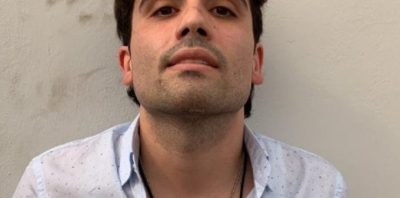Mexico president defends release of El Chapo’s son after mayhem

Mexico’s president faced a firestorm of criticism on Friday as his security forces acknowledged they arrested kingpin Joaquin “El Chapo” Guzman’s son, then released him when his cartel responded with an all-out gun battle.
Admitting his troops carried out a “badly planned” operation, Defense Minister Luis Sandoval said they briefly arrested Ovidio Guzman — one of several sons running the Sinaloa drug cartel since their father was extradited to the US in 2017 — but released him after being overpowered.
“It was a badly planned strategy,” Sandoval told a news conference in Culiacan, the western city of 750,000 people that was turned into an urban war zone Thursday.
“The task force acted too hastily. (The operation) wasn’t improvised, there was planning, but… it takes time to obtain an arrest warrant. When the operation was already underway, they decided to improvise and try to obtain a positive result,” he said, after flying into the city — the state capital of Sinaloa, the Guzmans’ bastion — for an emergency security cabinet meeting.
He added the authorities never “formally detained” Guzman, 28, one of at least nine children “El Chapo” fathered with three wives.
The six hours of clashes left one civilian and seven soldiers dead, and three police wounded, officials said.
Stinging Criticism
Heavily armed cartel gunmen surrounded the house where Guzman was being held Thursday afternoon and launched a massive machine-gun assault on various parts of the city, sending terrified residents fleeing for safety and leaving the streets strewn with blazing vehicles.
President Andres Manuel Lopez Obrador defended the decision to free Guzman.
“I support the decisions that were made. The situation turned very difficult and many citizens’ lives were at risk,” he told a separate news conference.
“You can’t fight fire with fire,” added the leftist leader, who said Mexico was acting on a US request for Guzman’s extradition, received in September 2018.
But the incident turned what was already a difficult week on the security front — with two other gun battles that killed 28 people — into a total nightmare for the leftist leader.
“Little Chapo brings (the government) to its knees,” newspaper Reforma said in a banner headline.
“This is a disaster any way you look at it,” tweeted security analyst Alejandro Hope.
In Congress, members of the conservative National Action Party called on Lopez Obrador and his security cabinet to step down.
“Resign!” they chanted on the floor of the lower house.
Security Minister Alfonso Durazo denied officials had negotiated Guzman’s release with his cartel.
Murky Facts
The government also faced criticism for its murky communications.
Durazo initially said the gun battle erupted when soldiers on a routine patrol happened upon Guzman.
Lopez Obrador, however, called it a planned operation carried out with an arrest warrant. Sandoval said there was no warrant.
The government, which initially released only hazy details, took around 18 hours to admit publicly that it had captured and released Guzman.
Murder Surge
“El Chapo,” 62, was sentenced to life in prison in July in New York for trafficking hundreds of tons of cocaine, heroin, methamphetamine and marijuana into the United States over the course of a quarter-century.
However, his cartel remains one of the most powerful in Mexico.
His extradition unleashed an initial period of instability in the group, as Ovidio and his brothers waged war with cartel co-founder Ismael “El Mayo” Zambada for control.
But the situation has stabilized into a reluctant truce.
The Guzman brothers have tried to fill their father’s shoes, but anti-narcotics experts portray them as flashy party boys who have little ability to run the business side of the cartel.
Lopez Obrador, who took office in December 2018, has struggled to rein in the brutal violence racking Mexico.
The country has registered more than 250,000 murders since the government controversially deployed the army to fight drug cartels in 2006.
Many experts blame the “drug war” for spiralling violence, as fragmented cartels battle each other and the army.
This year appears on track to set a new homicide record, with 23,063 murders as of August.

